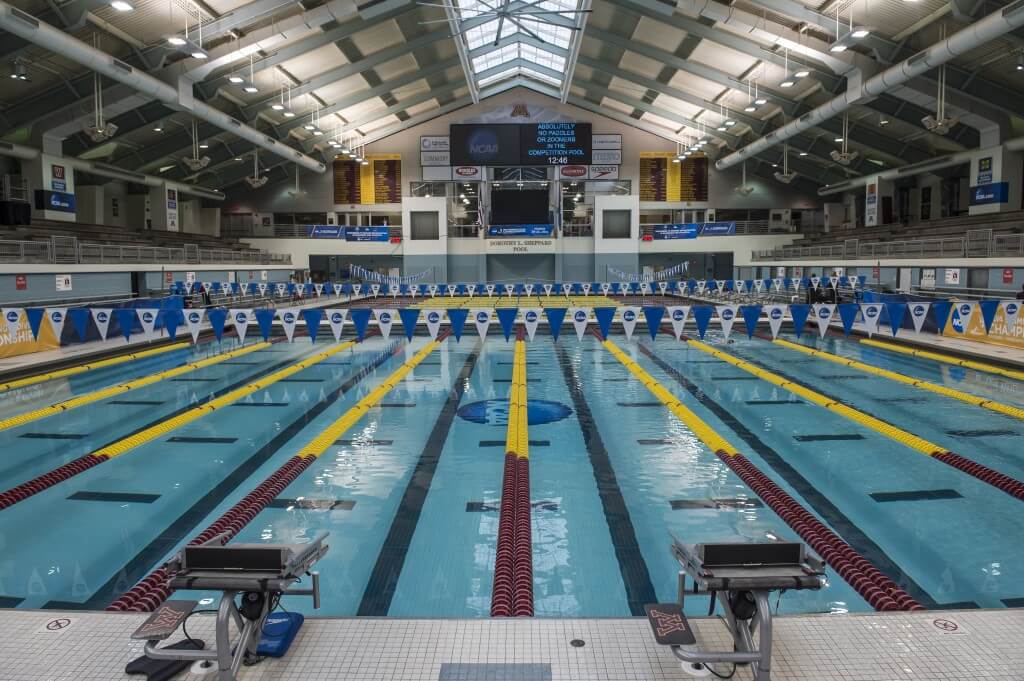In a COVID-Affected Season, Swimmers With Different Perspectives At Big Ten Champs

In a COVID-Affected Season, Swimmers With Different Perspectives At Big Ten Champs
The Big Ten Women’s Swimming Championships look slightly different this year on account of COVID-19 regulations, continuing an already unusual season. Mask wearing, the absence of spectators, the rotation of warmup lanes and the limiting of pool-deck seating to eight athletes per team, plus their coaches, are among the major changes the meet is enforcing to keep participants healthy.
Despite significantly altering the format of the competition, these sort of guidelines are familiar to and anticipated by swimmers in the Big Ten Conference, who have adapted to prepare for their conference meet.
Big Ten schools have complied with COVID-19 regulations since the season began in fall 2020. Mask wearing during weightlifting sessions and on the pool deck is fundamental, with swimmers participating in frequent COVID-19 testing on their campuses as well.
The University of Wisconsin-Madison is one of multiple teams that experienced an altered practice schedule. The team split into two groups for practices at the beginning of its season, and swimmers were limited to weightlifting with their roommates. The team’s season was further affected by the construction of their new pool in the Nicholas Recreation Center, which forced swimmers to train at a different location until early October.
According to senior swimmer Alex Reddington, the Wisconsin coaching staff prepared the team for racing by running intrasquad meets in the fall and simulating races during several practices. She says that learning to be present and smiling more often at practices have been some of her personal takeaways this season.
“This year, no practice, or meet, was guaranteed,” said Reddington. “This helped me to better mentally approach practices and meets and be grateful that I was able to be in the water that day.”
A junior at Indiana University Bloomington, Noelle Peplowski said the cream and crimson were able to start practices normally in the fall, with the team foregoing a Thanksgiving break to avoid COVID-19 exposure. Some of Indiana’s main focuses this season involve swimmers investing in one another and taking charge of the variables they can control.
“As a team, we always want to be the best that we can be,” said Peplowski. “We want to leave everything in the pool and be able to come out of the meet knowing that we fought for every race.”
Peplowski says the 2020-21 season allowed her an opportunity for self-reflection, and gave her a great appreciation for swimming, her relationships with loved ones and life in general.
Jasmine Hellmer, a junior at Northwestern University, had her January training interrupted by a nine-day quarantine resulting from COVID-19 contact tracing. She says taking things one hour at a time has helped to combat mental obstacles she encountered this year.
“I used to dread three or more days out of the water in fear of losing my rhythm and endurance,” said Hellmer. “After the events of 2020 and month-long periods out of the water, taking time off four weeks prior to Big Tens suddenly seemed like a minor roadblock.”
Hellmer says Northwestern’s team has been focusing on creating a motivating and energetic practice environment to combat any dullness or monotony abetted by the pandemic.
Two Big Ten teams faced a different and jarring effect of the pandemic. Both Michigan State University and the University of Iowa’s men’s and women’s swimming and diving teams trained through the year with the knowledge that they would be cut from university athletics at the end of their seasons.
Hawkeye freshman Alexa Puccini joined three of her teammates in a Title IX lawsuit against the University of Iowa this year, which assisted in the recent reinstatement of the women’s swimming and diving team.
“From the very beginning of our season we overcame so many obstacles and became closer as a team,” said Puccini. “We all kept our heads high and trained just as hard, if not harder, then we ever have before.”
Puccini says she hopes to final in an individual event at her first conference meet, and is excited to help showcase her team’s talent and hard work.
Michigan State University’s athletic department has not reinstated men’s or women’s swimming and diving, despite the filing of a lawsuit by 11 swimmers and continued advocacy for reinstatement by many Big Ten teams, including the University of Michigan.
Sophomore swimmer Jack Hiss says the adversity he faced with the pandemic and MSU’s decision to cut his sport has made him stronger. Looking to the Men’s Big Ten Swimming Championships on March 2, Hiss says he believes in himself and his teammates now more than ever.
“I will take that same mentality into the Big Ten Championships,” Hiss said. “One day at a time, one race at a time, one stroke at a time.”
.jpg)
- 2018 WOMEN'S FULL RESULTS
- 2018 MEN'S FULL RESULTS
- 2019 WOMEN'S FULL RESULTS
- 2019 MEN'S FULL RESULTS
- 2020 WOMEN'S FULL RESULTS
- 2020 MEN'S FULL RESULTS
- 2021 WOMEN'S FULL RESULTS
- 2021 MEN'S FULL RESULTS
- LIVE STREAM
- 2022 WOMEN'S FULL RESULTS
- 2022 MEN'S FULL RESULTS
- 2023 WOMEN'S FULL RESULTS
- 2023 MEN'S FULL RESULTS
- 2024 WOMEN'S FULL RESULTS



